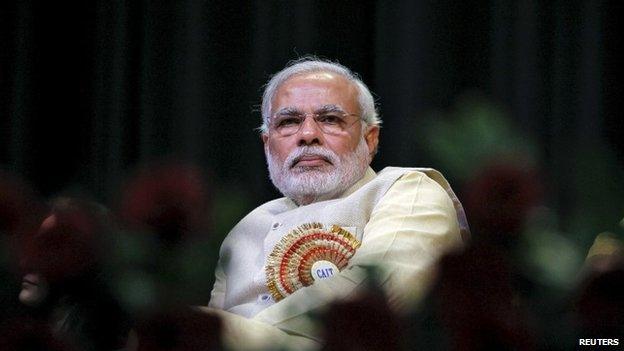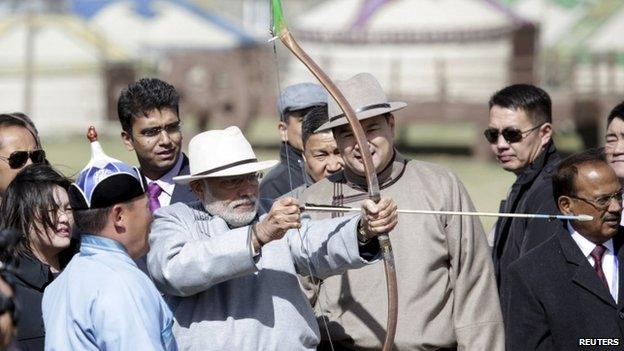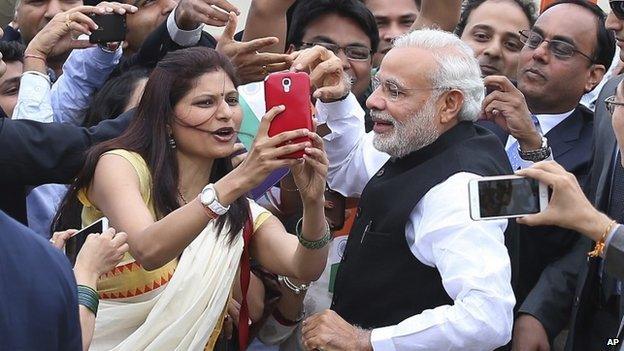Has Narendra Modi lived up to expectations?
- Published

Mr Modi swept to power by inflicting a heavy defeat on Congress
Is a year in power long enough to evaluate the performance of a new government? Possibly difficult in a country with many unresolved social and economic issues like India, but it is a good time for some stock-taking.
So it is with Narendra Modi and his BJP government, which stormed into power last May.
Mr Modi ran a presidential-style campaign, promising achhe din, or better times, if elected. It is a promise which his supporters continue to cling to, and his detractors sneer at, saying it was a deceit to capture political power.
Yet, if opinion polls are to be believed, Indians continue to be hopeful about Mr Modi.
A poll by Mint newspaper, external found the prime minister has an approval rating of 74%, although down eight percentage points since last August. Another poll by the Times of India , externalfound 47% of the respondents saying that Mr Modi's performance in government had been "somewhat good", and an ambivalent quarter saying that it had been "neither good, nor bad".
In truth, Mr Modi faces little competition: the Congress party, under Sonia and Rahul Gandhi has still not recovered from last year's debacle, despite the latter's spirited recent efforts to pick up the gauntlet. India's Grand Old Party remains largely bereft of new ideas to fire the imagination of India's restless young, who form the bulk of voters.
Mr Modi's first year in office has met with a mixed response.
All leaders need luck on their side, and Mr Modi has had his share. Inflation has been tamed, and the fiscal deficit contained. For both, Mr Modi should thank cheap commodity - mainly oil - prices. Electricity generation has surged to a record high, external.

Mr Modi's foreign policy initiatives have been energetic
His government so far has been free of scams, and he is making his ministers and bureaucrats work hard. Plans to auction mineral rights - starting with this year's coal auction - should check corruption and foster transparency. He has energised India's foreign policy, openly courting countries like Japan, Australia, Israel and the US. He is mining the diaspora. Taking the lead in evacuating stranded people in conflict-zones like Yemen and rushing relief to earthquake-ravaged Nepal has earned his government rightful praise. "Two foreign policy priorities have emerged: South Asia and the management of a larger periphery with a focus on China," says Harsh V Pant of King's College, London.
There are reports, external of industrialists, bureaucrats and politicians saying that corruption at the top has "declined dramatically". If this is true, it is a welcome change from the scam-tainted Congress government. Mr Modi is prolific on social media and speaks to the people frequently through a monthly radio address and frequent speeches, which can sometime look and sound like exercises in choreographed triumphalism. Unlike his taciturn predecessor Manmohan Singh, Mr Modi is a better communicator.
But all of this is still - strangely - not translating into a resurgent economy: companies are not performing well, industrial output is flat, bank credit is languishing, the property market is gloomy. Messy taxation is putting off investors. A simpler and fairer land acquisition law that many believe India badly needs to build infrastructure and industry has become a lightning rod for discontent, and unless it gains bipartisan support, could be doomed to legislative limbo.
The goods and services tax,, external India's single biggest tax reform after Independence, appears to be embroiled in familiar political differences, and many believe that a watered down version is now being pushed through in what is seen as a shoddy compromise, external. Low commodity prices and bad weather have led to an unprecedented crisis in farming. There are reports about villagers suffering and confusion, external arising out of reported cutbacks to social welfare programmes.

Mr Modi is popular with the Indian diaspora
Also, many say, it is not clear whether Mr Modi is a serious reformer or somebody merely comfortable with tinkering with the status quo. Or whether, as economist Vivek Dehejia says, Mr Modi is attempting to deliver reforms "through a gradualist, rather than a radical, trajectory", external.
There is talk about reducing bloated government, but no radical reforms seem to be on the table. Some of Mr Modi's ambitious projects so far look like retreads of older ones. Failure to fix the basics could easily hobble each programme.
Mr Modi wants to set up 100 smart cities, external, but most of India's main cities have turned into urban dystopias. Nobody quite knows what Digital India means in a country where the elementary mobile telephone network is broken. How India will manufacture lots of goods in Mr Modi's Make in India programme with a low-skilled, poorly educated people is not clear. Mr Modi appears to be faint-hearted about tackling corruption at the bottom, which hurts the poor most. This, according to journalist James Crabtree, could stem from an "unwillingness to disturb powerful, entrenched interests, external" because to win the re-election in 2019 he will need lots of money.
"The present government has been almost hyperactive in its approach. The problem is that, when all is said and done, it is not clear that the whole is greater than the sum of its parts," says Milan Vaishnav of Carnegie Endowment for International Peace, Washington DC.
His critics say Mr Modi is a control freak who has concentrated too much power in his hands. Although he has pledged stern action against religious violence, a series of church attacks - which police deny had anything to do with the Christian community, external - and irresponsible rabble rousing by some of his hardline ministers and Hindu groups has led to what former BJP minister Arun Shourie calls "greater anxiety in social relations, external."
Others worry about what they say is Mr Modi and the party's intolerance to criticism - analyst TN Ninan says it follows "subaltern siege mentality: you are either one of us or not one of us, there is no room for middle ground", external, an attitude that has has led to a crackdown on civil society activists and hostility towards the media, among other things.
Mr Modi's problem is that he doesn't have the luxury his predecessors enjoyed. He raised massive hopes of transforming India; the tyranny of high expectations can bite badly.
Failing to deliver on a single major challenge could trip him up. Some 13 million Indians are seeking jobs every year, and if Mr Modi cannot get them work, he won't have their votes. This is no longer an India which is endlessly willing to wait patiently. Mr Modi must know that - and that he needs to do more.